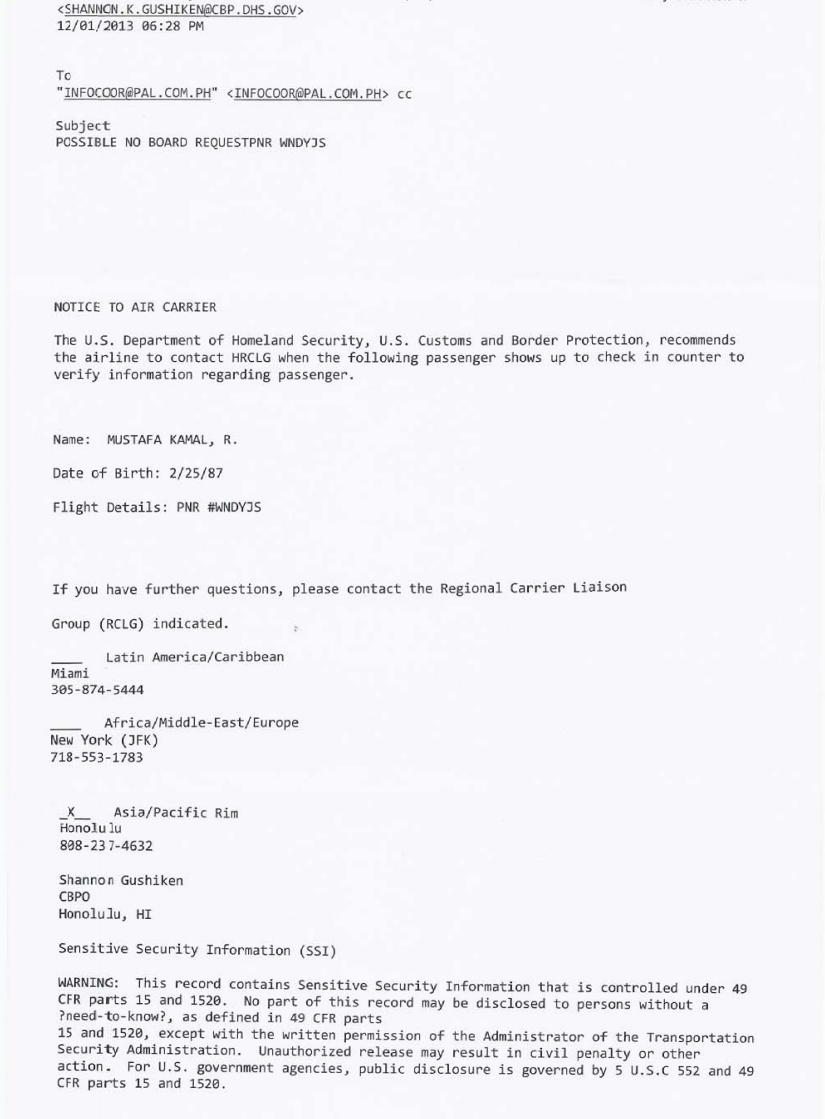“No-fly” trial, day 5, part 2: What happened to the plaintiff’s daughter?
“Your Honor, we’ve confirmed that the defendants did nothing to deny plaintiff’s daughter boarding. It’s our understanding that she just simply missed her flight.”
Neither the public, nor Dr. Rahinah Ibrahim, nor her daughter, Seattle-born U.S. citizen Raihan binti Mustafa Kamal, yet know why a U.S. Customs and Border Protection Officer sent the email message excerpted above to the airline on which Ms. Mustafa Kamal was scheduled to fly to San Francisco last Sunday to testify at the trial in Dr. Ibrahim’s lawsuit challenging her placement on the U.S. no-fly list. (Click the image for a larger version or here for the complete e-mail forwarding thread.)
We do know, however, that whatever happened when Ms. Mustafa Kamal showed up at Kuala Lumpur International Airport (KUL) two hours and 45 minutes before the scheduled departure of her flight and tried to check in, it certainly wasn’t (and CBP’s lawyers in San Francisco certainly couldn’t later have “confirmed”, as they claimed to the court on Monday), that Ms. Mustafa Kamal “just simply missed her flight”.
Friday afternoon, after what was to have been the conclusion of the trial in Ibrahim v. DHS, Judge William Alsup held an evidentiary hearing and heard argument from lawyers for Dr. Ibrahim and the government regarding what happened to Ms. Mustafa Kamal and what (if anything) he should do about it.
(See our separate article about the morning session, including the possibility of bar complaints against some of the government’s lawyers and a history lecture from Judge Alsup to the government about the blacklisting of Robert Oppenheimer on the basis of secret, false, allegations that he was a Communist: “No-fly” trial, day 5, part 1: Closing arguments.)
At the insistence of the government and on the basis of a declaration submitted in advance by the one witness, and over objections by Dr. Ibrahim’s lawyers, the courtroom was cleared for almost the entirety of both the hearing and the argument. The only in-person witness, Ms. Maureen Dugan, Director of the “National Targeting Center” operated by the Customs and Border Protection (CBP) division of DHS in Reston, Virginia, was questioned only behind closed doors, and her additional written declaration was filed with the court under seal.
Dr. Ibrahim’s lawyers were unable to present her side of the story through in-person testimony, of course, since the U.S. government agencies which are the defendants in the case have prevented both Dr. Ibrahim and Ms. Mustafa Kamal from coming to the U.S. for the trial. But a sworn written declaration by Ms. Mustafa Kamal, including the email message from CBP that led to her being denied boarding when she tried to fly to San Francisco last Sunday for the trial, was filed in the public court docket.
Following the hearing, Dr. Ibrahim’s lead counsel, Elizabeth Pipkin, said that at the conclusion of the closed court session Judge Alsup ruled:
- That the parties could refer to the events, exhibits, and testimony related to Ms. Mustafa Kamal in their proposed findings of fact and conclusions of law in Dr. Ibrahim’s case, and
- That Dr. Ibrahim and her lawyers would be allowed until noon Monday, December 9th, to decide whether to move to re-open the case.
If the case is re-opened, the parties would be able to present new evidence, call new witnesses, and/or re-call witnesses including government witnesses whose original testimony might be contradicted and whose credibility might be impeached by what happened to Ms. Mustafa Kamal and what statements they made about it. Ms. Mustafa Kamal could even be called as a witness, if she could find the money for another airline ticket and make it to the U.S. (In her declaration, she says that her original ticket cost MYR5751, equivalent to US$1782, and she can’t afford another ticket at that price. It’s already peak season for trans-Pacific travel to and from SFO, and on many airlines seats are unavailable at any price until after New Years.)
Aside from seeing Ms. Dugan enter and leave the closed courtroom, and what Ms. Pipkin said afterward about Judge Alsup’s rulings, we don’t know what the government may have claimed to Judge Alsup.
But when read closely, the public filings from Ms. Mustafa Kamal raise extraordinary questions of whether CBP and DHS have:
- Misrepresented their operations in official statements including their most recent formal report to the European Union on how they use airline reservation data,
- Tried to secretly strip a person born in the U.S. of her citizenship through some secret administrative action or deem her “inadmissible” to the U.S. despite her U.S. citizenship, and/or
- Misled the airline about the basis for their no-board request, and manipulated the airline through those false pretenses into wrongly denying boarding to Ms. Mustafa Kamal despite the fact that she is a native-born U.S. citizen with an absolute, unconditional, and irrevocable entitlement to admission to the U.S.
